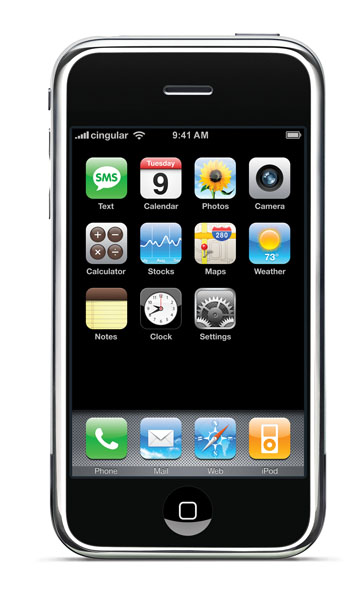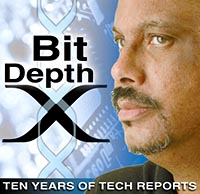BitDepth 560 - January 23
07/01/09 19:23 Filed in: BitDepth - January 2007
Apple's long rumoured iPhone creates excitement and controversy after it is introduced...
Apple tries to remake the phone

Apple's iPhone, a slab of plexiglas and metal that inherits the style of the iPod, the operating system of the Macintosh and marries them into a phone that the company hopes will capture a slice of the mobile phone market. Photo courtesy Apple Inc.
Distilling Steve Jobs' influence on Apple is actually quite easy. Under his leadership, the company has consistently examined trends in technology and offered solutions which mask the underpinnings of technology behind appealing interfaces.
While the product that got the company started was supremely geeky, a homemade motherboard wrapped in crude boxing, every step the company took after that was directed to improving elegance in packaging and usability.
That mission reached its peak with the Macintosh in 1984, the first commercially available computer to offer a point and click interface and the iPod in 2001.
While there were computers and MP3 players available when Apple launched its own take on these technologies, the markets were small and undefined, but the same can't be said of mobile phones, which are widely used and market segmented.
So it was something of a surprise, despite all the buzz around the rumour websites for months, to find Apple taking a dip in these turbulent waters with its newest product, the iPhone.
What the iPhone turned out to be is a sleek and intriguing new take on how a phone might be used for 21st century communications networks. The device dispenses with the key studded surfaces of today's phones in favour of a sheer plexiglass screen that displays virtual buttons that respond to touch and finger gestures. "Squeezing" a photo displayed on the screen with a pinching gesture, for instance, reduces it.
In the Steve Jobs Macworld keynote address which introduced the product to the world, the Apple boss demonstrated how to switch between phone functions, which include address books, an iPod-style music player and a widescreen playback device for movies along with more prosaic virtual dialpad and texting functions.
A proximity sensor built into the phone's face senses when you're making a call and switches off the touch sensitivity when you bring the phone up to your head.
Even more intriguing than everything that the iPhone is, are the considerable number of things that it is not.
It is not, for instance, even for sale yet. The phone won't be on the market until June and is still awaiting FCC approvals. It is not available for any US phone network other than Cingular for at least two years, a deal that Apple must have cut reluctantly to ensure that at least one provider would get behind their product seriously, a necessity in today's busy marketplace.
It will not be available unlocked in the US, and the company has announced no plans for distributing it outside the American market.
It is not cheap, with prices ranging from US$499 for a 4GB model and $599 for an 8GB version, though those prices are roughly in line with other top of the line smart phones from Nokia, Blackberry, Sony and Palm.
I'm also guessing that on shipment, it also won't be called the iPhone either, given the fuss that the network hardware company Cisco is raising over the rather glaring fact that they happen to own that name.
According to filing information posted on findlaw.com, despite a curious attempt by a company known as Ocean Telecom Services LLC to file a competing trademark application based on trademark registration originating in Trinidad and Tobago, Infogear Technology Corporation, since acquired by Cisco, has been the owner of the iPhone trademark name since 1999.
Apple seems to be engaged in an interesting game of "brandsquatting," claiming mindshare rights to their newest "i" prefixed device to neutralise competition before offering the device for sale under a more legally acceptable name.
To claim even a one percent share of the mobile phone market, Apple will have to move ten million units of their new phone, whatever it's named, in a market that's probably already moving fast to counter this startling new vision of how a communications device might look and work.
Apple, Ocean Telecom and T&T
Late in the last century, as it began a resurgence in the computer market with its iMac computer, Apple wasn't thinking about phones. But other manufacturers were looking at every element of Apple's style. George Foreman grills were offered in the fruity iMac colours, and name grabs began on i-everything.
Now that Apple Inc is making its first foray into the mobile phone business, it's found that iPhone was one of the first names to be snapped up. Most instances of iPhone on the Internet are already taken and in Canada, Comwave Telecom has been offering a voice over IP phone under the brand since 2004.
Ocean Telecom Services, which claims to have applied for trademark status for the brand iPhone in Trinidad and Tobago under filing number 37090, has also applied for trademark status for iPhone in Hong Kong and the UK.

Apple's iPhone, a slab of plexiglas and metal that inherits the style of the iPod, the operating system of the Macintosh and marries them into a phone that the company hopes will capture a slice of the mobile phone market. Photo courtesy Apple Inc.
Distilling Steve Jobs' influence on Apple is actually quite easy. Under his leadership, the company has consistently examined trends in technology and offered solutions which mask the underpinnings of technology behind appealing interfaces.
While the product that got the company started was supremely geeky, a homemade motherboard wrapped in crude boxing, every step the company took after that was directed to improving elegance in packaging and usability.
That mission reached its peak with the Macintosh in 1984, the first commercially available computer to offer a point and click interface and the iPod in 2001.
While there were computers and MP3 players available when Apple launched its own take on these technologies, the markets were small and undefined, but the same can't be said of mobile phones, which are widely used and market segmented.
So it was something of a surprise, despite all the buzz around the rumour websites for months, to find Apple taking a dip in these turbulent waters with its newest product, the iPhone.
What the iPhone turned out to be is a sleek and intriguing new take on how a phone might be used for 21st century communications networks. The device dispenses with the key studded surfaces of today's phones in favour of a sheer plexiglass screen that displays virtual buttons that respond to touch and finger gestures. "Squeezing" a photo displayed on the screen with a pinching gesture, for instance, reduces it.
In the Steve Jobs Macworld keynote address which introduced the product to the world, the Apple boss demonstrated how to switch between phone functions, which include address books, an iPod-style music player and a widescreen playback device for movies along with more prosaic virtual dialpad and texting functions.
A proximity sensor built into the phone's face senses when you're making a call and switches off the touch sensitivity when you bring the phone up to your head.
Even more intriguing than everything that the iPhone is, are the considerable number of things that it is not.
It is not, for instance, even for sale yet. The phone won't be on the market until June and is still awaiting FCC approvals. It is not available for any US phone network other than Cingular for at least two years, a deal that Apple must have cut reluctantly to ensure that at least one provider would get behind their product seriously, a necessity in today's busy marketplace.
It will not be available unlocked in the US, and the company has announced no plans for distributing it outside the American market.
It is not cheap, with prices ranging from US$499 for a 4GB model and $599 for an 8GB version, though those prices are roughly in line with other top of the line smart phones from Nokia, Blackberry, Sony and Palm.
I'm also guessing that on shipment, it also won't be called the iPhone either, given the fuss that the network hardware company Cisco is raising over the rather glaring fact that they happen to own that name.
According to filing information posted on findlaw.com, despite a curious attempt by a company known as Ocean Telecom Services LLC to file a competing trademark application based on trademark registration originating in Trinidad and Tobago, Infogear Technology Corporation, since acquired by Cisco, has been the owner of the iPhone trademark name since 1999.
Apple seems to be engaged in an interesting game of "brandsquatting," claiming mindshare rights to their newest "i" prefixed device to neutralise competition before offering the device for sale under a more legally acceptable name.
To claim even a one percent share of the mobile phone market, Apple will have to move ten million units of their new phone, whatever it's named, in a market that's probably already moving fast to counter this startling new vision of how a communications device might look and work.
Apple, Ocean Telecom and T&T
Late in the last century, as it began a resurgence in the computer market with its iMac computer, Apple wasn't thinking about phones. But other manufacturers were looking at every element of Apple's style. George Foreman grills were offered in the fruity iMac colours, and name grabs began on i-everything.
Now that Apple Inc is making its first foray into the mobile phone business, it's found that iPhone was one of the first names to be snapped up. Most instances of iPhone on the Internet are already taken and in Canada, Comwave Telecom has been offering a voice over IP phone under the brand since 2004.
Ocean Telecom Services, which claims to have applied for trademark status for the brand iPhone in Trinidad and Tobago under filing number 37090, has also applied for trademark status for iPhone in Hong Kong and the UK.
blog comments powered by Disqus

